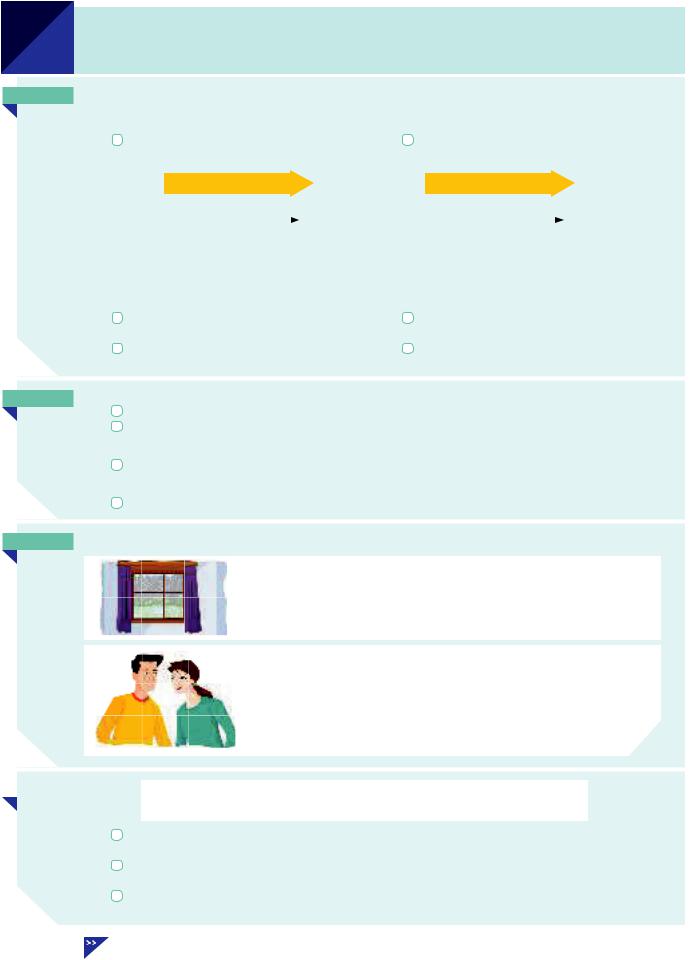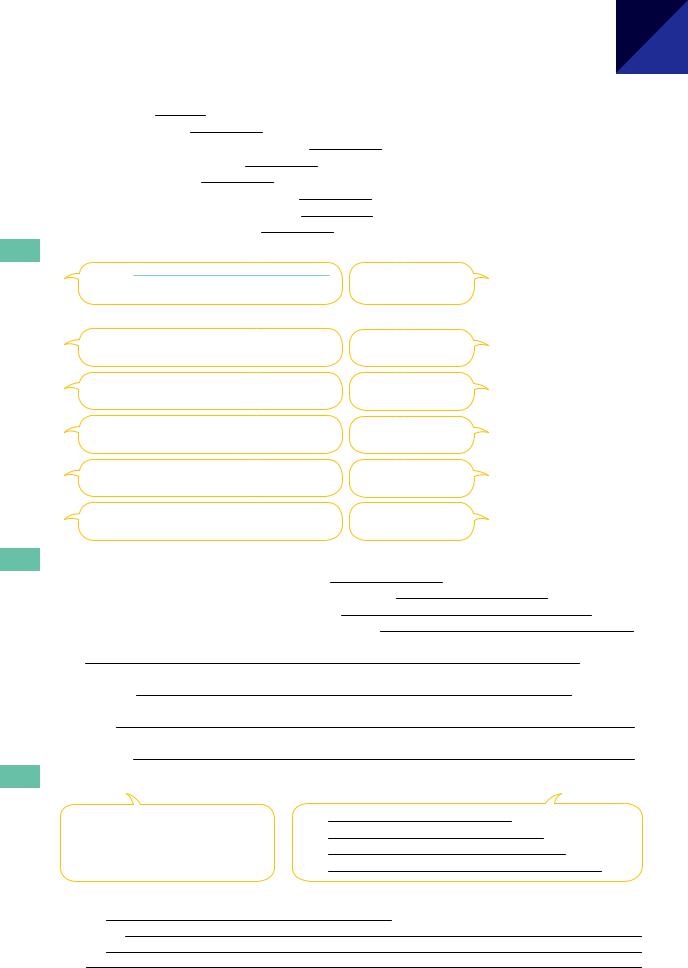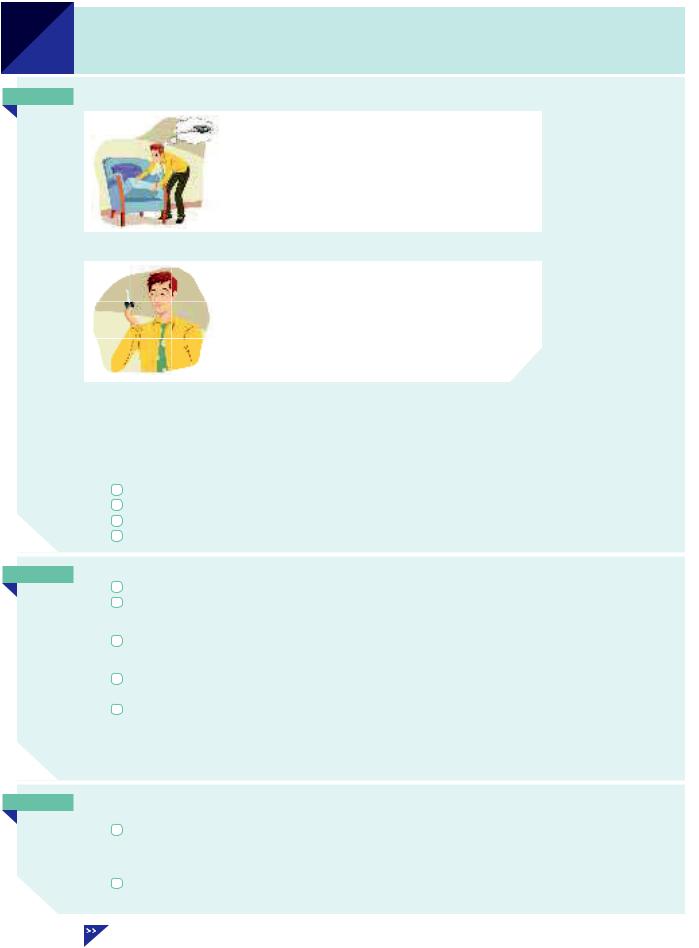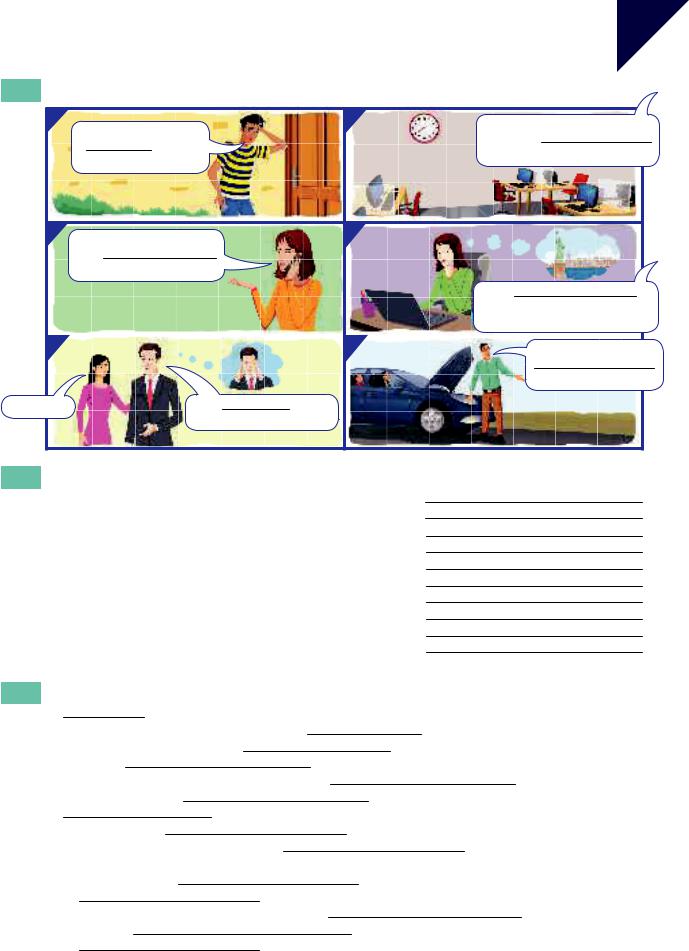
- •Contents
- •Thanks
- •To the student
- •To the teacher
- •3 Present continuous and present simple 1 (I am doing and I do)
- •10 Present perfect continuous and simple (I have been doing and I have done)
- •11 how long have you (been) … ?
- •12 for and since when … ? and how long … ?
- •13 Present perfect and past 1 (I have done and I did)
- •14 Present perfect and past 2 (I have done and I did)
- •15 Past perfect (I had done)
- •16 Past perfect continuous (I had been doing)
- •17 have and have got
- •18 used to (do)
- •19 Present tenses (I am doing / I do) for the future
- •20 I’m going to (do)
- •21 will and shall 1
- •22 will and shall 2
- •23 I will and I’m going to
- •24 will be doing and will have done
- •26 can, could and (be) able to
- •27 could (do) and could have (done)
- •28 must and can’t
- •29 may and might 1
- •30 may and might 2
- •31 have to and must
- •32 must mustn’t needn’t
- •33 should 1
- •34 should 2
- •35 I’d better … it’s time …
- •36 would
- •39 if I knew … I wish I knew …
- •40 if I had known … I wish I had known …
- •41 wish
- •42 Passive 1 (is done / was done)
- •43 Passive 2 (be done / been done / being done)
- •44 Passive 3
- •45 it is said that … he is said to … he is supposed to …
- •46 have something done
- •47 Reported speech 1 (he said that …)
- •48 Reported speech 2
- •49 Questions 1
- •52 Question tags (do you? isn’t it? etc.)
- •53 Verb + -ing (enjoy doing / stop doing etc.)
- •54 Verb + to … (decide to … / forget to … etc.)
- •55 Verb (+ object) + to … (I want you to …)
- •56 Verb + -ing or to … 1 (remember, regret etc.)
- •57 Verb + -ing or to … 2 (try, need, help)
- •58 Verb + -ing or to … 3 (like / would like etc.)
- •59 prefer and would rather
- •60 Preposition (in/for/about etc.) + -ing
- •61 be/get used to … (I’m used to …)
- •63 there’s no point in -ing, it’s worth -ing etc.
- •64 to … , for … and so that …
- •65 Adjective + to …
- •66 to … (afraid to do) and preposition + -ing (afraid of -ing)
- •67 see somebody do and see somebody doing
- •68 -ing clauses (He hurt his knee playing football.)
- •69 Countable and uncountable 1
- •70 Countable and uncountable 2
- •71 Countable nouns with a/an and some
- •74 the 2 (school / the school etc.)
- •75 the 3 (children / the children)
- •77 Names with and without the 1
- •78 Names with and without the 2
- •79 Singular and plural
- •80 Noun + noun (a bus driver / a headache)
- •81 -’s (your sister’s name) and of … (the name of the book)
- •82 myself/yourself/themselves etc.
- •83 a friend of mine my own house on my own / by myself
- •84 there … and it …
- •85 some and any
- •87 much, many, little, few, a lot, plenty
- •90 all every whole
- •91 each and every
- •92 Relative clauses 1: clauses with who/that/which
- •94 Relative clauses 3: whose/whom/where
- •95 Relative clauses 4: extra information clauses (1)
- •96 Relative clauses 5: extra information clauses (2)
- •97 -ing and -ed clauses (the woman talking to Tom, the boy injured in the accident)
- •98 Adjectives ending in -ing and -ed (boring/bored etc.)
- •99 Adjectives: a nice new house, you look tired
- •100 Adjectives and adverbs 1 (quick/quickly)
- •102 so and such
- •104 quite, pretty, rather and fairly
- •105 Comparative 1 (cheaper, more expensive etc.)
- •106 Comparative 2 (much better / any better etc.)
- •107 Comparative 3 (as … as / than)
- •108 Superlative (the longest / the most enjoyable etc.)
- •109 Word order 1: verb + object; place and time
- •110 Word order 2: adverbs with the verb
- •111 still any more yet already
- •112 even
- •114 in case
- •116 as (as I walked … / as I was … etc.)
- •117 like and as
- •119 during for while
- •121 at/on/in (time)
- •122 on time and in time at the end and in the end
- •123 in/at/on (position) 1
- •124 in/at/on (position) 2
- •125 in/at/on (position) 3
- •126 to, at, in and into
- •127 in/on/at (other uses)
- •129 Noun + preposition (reason for, cause of etc.)
- •130 Adjective + preposition 1
- •131 Adjective + preposition 2
- •132 Verb + preposition 1 to and at
- •134 Verb + preposition 3 about and of
- •135 Verb + preposition 4 of/for/from/on
- •136 Verb + preposition 5 in/into/with/to/on
- •137 Phrasal verbs 1 Introduction
- •138 Phrasal verbs 2 in/out
- •139 Phrasal verbs 3 out
- •142 Phrasal verbs 6 up/down
- •143 Phrasal verbs 7 up (1)
- •144 Phrasal verbs 8 up (2)
- •145 Phrasal verbs 9 away/back
- •Additional exercises
- •Study guide
- •Key to Exercises
- •Key to Additional exercises (see page 302)
- •Key to Study guide
- •Index

Unit
12 for and since when … ? and how long … ?
AWe use for and since to say how long something has been happening.
|
|
|
|
|
|
|
|
|
|
|
|
|
|
|
|
|
We use for + a period of time: |
|
|
|
|
|
We use since + the start of a period: |
||||||||
|
We’ve been waiting for two hours. |
|
|
|
We’ve been waiting since 8 o’clock. |
||||||||||
|
|
|
for two hours |
|
|
|
|
|
|
since 8 o’clock |
|
|
|
||
|
|
|
|
|
|
|
|
|
|
|
|
||||
|
|
|
|
|
|
|
|
|
|
|
|
|
|
|
|
|
two hours ago |
|
|
now |
|
|
|
8 o’clock |
|
now |
|||||
|
|
|
|||||||||||||
|
|
|
|
|
|
|
|
|
|
|
|
|
|
|
|
|
|
|
for |
|
|
|
|
|
|
|
|
since |
|
|
|
|
two hours |
a long time |
a week |
|
|
|
8 o’clock |
April |
lunchtime |
|
|||||
|
20 minutes |
six months |
ages |
|
|
|
Monday |
2001 |
we arrived |
|
|||||
|
five days |
50 years |
years |
|
|
|
12 May |
Christmas |
I got up |
|
|||||
|
|
|
|
|
|
|
|
|
|||||||
|
Sally has been working here for six |
|
|
|
Sally has been working here since |
||||||||||
|
months. (not since six months) |
|
|
|
April. (= from April until now) |
||||||||||
|
I haven’t seen Tom for three days. |
|
|
|
I haven’t seen Tom since Monday. |
||||||||||
|
|
|
|
|
|
|
|
|
|
|
|
|
|
|
|
|
|
|
|
|
|
|
|
|
|
|
|
|
|
|
|
BWe oten leave out for (but not usually in negative sentences):
They’ve been married for ten years. or They’ve been married ten years.
They haven’t had a holiday for ten years. (you need for)
You can use in instead of for in negative sentences (I haven’t … etc.):
They haven’t had a holiday in ten years. (= for ten years)
We do not use for + all … (all day / all my life etc.):
I’ve lived here all my life. (not for all my life)
CCompare when … ? (+ past simple) and how long … ? (+ present perfect):
a:When did it start raining?
b:It started raining an hour ago / at 1 o’clock.
a:How long has it been raining?
b:It’s been raining for an hour / since 1 o’clock.
a:When did Joe and Kate first meet?
a long time ago.
b:They first met when they were at school.
a:How long have they known each other?
|
|
|
|
|
|
for a long time. |
|
|
|
|
|
b: They’ve known each other |
|
||
|
|
|
|
|
|
since they were at school. |
|
|
|
|
|
|
|
|
|
D |
We say: |
|
it’s |
(= it is) |
a long time |
|
since something happened |
|
|
or |
it’s been |
(= it has been) |
six months (etc.) |
||
|
|
|
|||||
|
|
|
|
|
|
|
|
It’s two years since I last saw Joe. or It’s been two years since …
(= I haven’t seen Joe for two years)
It’s ages since we went to the cinema. or It’s been ages since …
(= We haven’t been to the cinema for ages)
How long is it since Mrs Hill died? or How long has it been since …
(= when did she die?)
24 |
How long have you (been) … ? Unit 11 |

Exercises
12.1 |
Write for or since. |
|
|
|
1 |
It’s been raining since |
lunchtime. |
|
|
2 |
Paul has lived in Brazil |
ten years. |
|
|
3 |
I’m tired of waiting. We’ve been sitting here |
an hour. |
||
4 |
Kevin has been looking for a job |
he let school. |
||
5 |
I haven’t been to a party |
ages. |
|
|
6 |
I wonder where Joe is. I haven’t seen him |
last week. |
||
7 |
Jane is away on holiday. She’s been away |
Friday. |
||
8 |
The weather is dry. It hasn’t rained |
a few weeks. |
||
12.2 Look at each answer and choose the right question.
Unit
12
1How long have they been married ?
|
When did they get married? |
|
(When did they get married? is correct) |
2 |
How long have you had this car? |
|
When did you buy this car? |
3 |
How long have you been waiting? |
|
When did you get here? |
4How long have you been doing your course?
When did your course start?
5How long has Anna been in London?
When did Anna arrive in London?
6How long have you known each other?
When did you first meet each other?
Ten years ago.
About five years.
Only a few minutes.
September.
Last week.
A long time.
12.3 Read the situations and complete the sentences.
1 |
It’s raining. It’s been raining since lunchtime. It started raining |
2 |
Ann and Jess are friends. They first met years ago. They’ve known |
3 |
Mark is unwell. He became ill on Sunday. He has |
4 |
Sarah is married. She’s been married for a year. She got |
5You have a headache. It started when you woke up. I’ve
6Sue is in a meeting at work. It’s been going on since 9 o’clock. The meeting
7You’re working in a hotel. You started working there six months ago. I’ve been
8Kate is learning Japanese. She’s been doing this for a long time. Kate started
at lunchtime.
each other for years.
Sunday.
.
I woke up.
at 9 o’clock.
.
.
12.4 Complete B’s sentences.
|
A |
|
B |
1 |
Do you oten go on holiday? |
No, I haven’t had a holiday for |
five years. |
2 |
Have you seen Lisa recently? |
No, I |
about a month. |
3 |
Do you still go swimming regularly? |
No, I |
a long time. |
4 |
Do you still ride a bike these days? |
No, I |
ages. |
Now write B’s answers again. This time use It’s . . . since . . . .
5 |
(1) |
No, |
it’s five years since I last had a holiday. |
6 |
(2) |
No, it’s |
|
7 |
(3) |
No, |
|
8 |
(4) |
|
|
25

Unit
13 Present perfect and past 1 (I have done and I did)
AStudy this example situation:
Tom is looking for his key. He can’t find it.
He has lost his key. (present perfect)
This means that he doesn’t have his key now.
Ten minutes later:
Now Tom has found his key. He has it now.
Has he lost his key? No, he has found it.
Did he lose his key? Yes, he did.
He lost his key (past simple)
but now he has found it. (present perfect)
The present perfect (something has happened) is a present tense. It tells us about the situation now. ‘Tom has lost his key’ = he doesn’t have his key now (see Unit 7).
The past simple (something happened) tells us only about the past. If somebody says ‘Tom lost his key’, we don’t know whether he has the key now or not. We know only that he lost it at some time in the past.
Compare present perfect and past simple:
They’ve gone away. They’ll be back on Friday. (they are away now)
They went away, but I think they’re back at home now. (not They’ve gone away)
It has stopped raining now, so we don’t need the umbrella. (it isn’t raining now) It stopped raining for a while, but now it’s raining again. (not It has stopped)
BYou can use the present perfect for new or recent happenings:
I’ve repaired the washing machine. It’s working OK now. ‘Hannah has had a baby! It’s a boy.’ ‘That’s great news.’
Usually, you can also use the past simple:
I repaired the washing machine. It’s working OK now.
Use the past simple (not the present perfect) for things that are not recent or new:
Mozart was a composer. He wrote more than 600 pieces of music. (not has been … has written)
My mother grew up in Italy. (not has grown)
Compare:
Somebody has invented a new type of washing machine.
Who invented the telephone? (not has invented)
CWe use the present perfect to give new information (see Unit 7). But if we continue to talk about it,
we normally use the past simple:
a: Ow! I’ve burnt myself.
b: How did you do that? (not have you done) a: I picked up a hot dish. (not have picked)
a: Look! Somebody has spilt something on the sofa.
b: Well, it wasn’t me. I didn’t do it. (not hasn’t been … haven’t done)
|
Past simple Unit 5 Present perfect Units 7–8 Present perfect and past 2 Unit 14 |
26 |
American English Appendix 7 |

Exercises |
Unit |
13 |
|
|
|
13.1 Complete the sentences. Use the present perfect where possible. Otherwise use the past simple.
1 |
|
2 |
The o ice is empty now. |
I can’t get in. |
|
|
|
|
|
Everybody |
|
I ’ve lost |
(lose) my |
|
|
|
(go) home. |
||
key. |
|
|
|
|
|
|
3 |
I meant to call you last night, |
4 |
|
|
|
|
|
|
|
|
|
|
|
but I |
|
|
|
|
|
(forget). |
|
|
|
|
|
|
|
Helen |
|
|
|
|
|
(go) to New York for a holiday, but |
|
|
|
|
|
she’s back home in London now. |
|
|
|
|
|
|
|
5 |
before |
6 |
Can you help us? Our car |
||
|
|
|
|||
|
|
|
|
(break) down. |
|
Are you OK? |
Yes, I |
(have) a |
|
|
|
|
|
headache, but it’s OK now. |
|
|
|
13.2 Are the underlined parts of these sentences OK? Correct them where necessary.
1 Did you hear about Sophie? She’s given up her job. 2 My mother has grown up in Italy.
3 How many plays has William Shakespeare written? 4 I’ve forgotten his name. Is it Joe or Jack?
5 Who has invented paper?
6 Drugs have become a big problem everywhere. 7 We’ve washed the car, but now it’s dirty again. 8 Where have you been born?
9 Ellie has gone shopping. She’ll be back in about an hour.
10Albert Einstein has been the scientist who has developed the theory of relativity.
OK
My mother grew up
13.3 Put the verb into the correct form, present perfect or past simple.
1 |
It stopped |
raining for a while, but now it’s raining again. (it / stop) |
|
2 |
The town where I live is very dif erent now. It has changed a lot. (it / change) |
||
3 |
I studied German at school, but |
most of it now. (I / forget) |
|
4 |
The police |
three people, but later they let them go. (arrest) |
|
5 |
What do you think of my English? Do you think |
? (it / improve) |
|
6 |
Are you ready to go? |
your cof ee? (you / finish) |
|
7 |
|
for a job as a tour guide, but I wasn’t successful. (I / apply) |
|
8 |
Where’s my bike? |
outside the house, but it’s not there now. (it / be) |
|
9 |
Quick! We need to call an ambulance. |
an accident. (there / be) |
|
10 |
a: I’ve found my phone. |
|
|
|
b: Oh, good. Where |
it? (you / find) |
|
|
a: |
at the bottom of my bag. (It / be) |
|
11 |
a: Ben won’t be able to play tennis for a while. |
his arm. (He / break) |
|
|
b: Oh. How |
|
? (that / happen) |
|
a: |
of a ladder. |
(He / fall) |
27
